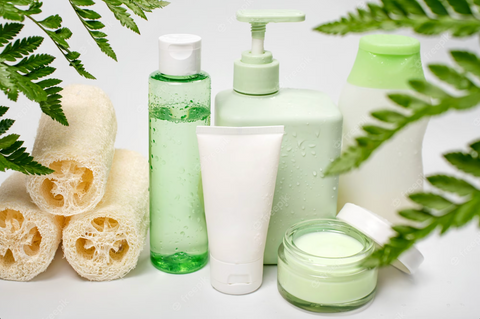Understanding Perimenopause and its Effects on the Skin
Perimenopause is the phase that precedes menopause and is characterized by a decline in estrogen levels. Perimenopause is a natural process of aging and a decrease in hormone production. It can be influenced by factors such as stress, birth control pills, and hormone disruption.
During perimenopause, many women experience extreme changes in their skin that they may not be aware are related to this transitional phase. The skin produces less collagen and tends to thin out, leading to the development of wrinkles. This decline in collagen production is associated with the decrease in DHEA (dehydroepiandrosterone), an adrenal hormone that plays a role in various aspects of health, including skin integrity and collagen production.
In addition to wrinkles, perimenopause can also cause other skin issues such as acne, redness, and increased dryness. It's important to understand the effects of perimenopause on the skin and take proactive steps to care for it during this transitional period.
Caring for Your Skin During Perimenopause and Beyond
As you navigate perimenopause and beyond, it's essential to adjust your skincare routine to address the changes happening in your skin. While there is no one-size-fits-all approach, incorporating certain ingredients and practices can help mitigate the effects of perimenopause on the skin.
1. Hydration is Key
One of the most important aspects of skincare during perimenopause is maintaining hydration. As estrogen levels decrease, the skin tends to become drier, more sensitive, and prone to itching. To combat dryness and prevent excess water loss, it's crucial to hydrate your skin regularly. Look for moisturizers and cleansers that contain ingredients like ceramides, hyaluronic acid, and glycerin, which help lock in moisture and maintain the skin's natural barrier.
2. Embrace the Power of Retinol
Retinol, a derivative of vitamin A, is a powerful ingredient that can benefit the skin during perimenopause. It stimulates collagen production, helps reduce the appearance of wrinkles, and improves skin texture. If you haven't used retinol before, start by incorporating it into your skincare routine gradually. Begin with a low concentration and gradually increase the frequency of use as your skin adjusts. Look for formulations that combine retinol with hydrating and soothing ingredients like hyaluronic acid, glycerin, and niacinamide to minimise dryness and sensitivity.
3. Harness the Potential of Peptides
Peptides are another valuable ingredient for menopausal skin. They stimulate collagen production, improving the skin's elasticity and reducing the appearance of fine lines and wrinkles. Peptides work by signalling cells to build more collagen and elastin, promoting a more youthful appearance. Look for skincare products that include peptides to reap their benefits and support your skin's natural collagen production.
4. Phytoestrogens for Replenishing Elasticity
Loss of elasticity is a common concern during menopause, affecting both the skin of the face and the genital area. Phytoestrogens, which are plant-derived compounds that mimic the effects of estrogen, can help replenish lost elasticity in the skin. These safe and natural ingredients, found in certain skincare products, can be effective in improving the contours of the face and restoring a more youthful appearance. Look for products formulated with potent phytoestrogens to address this specific concern.
5. Calming Products for Hot Flushes and Redness
During menopause, fluctuating hormone levels can lead to hot flushes and increased facial redness. Using calming skincare products and face mists can provide relief during these episodes. Keep a refreshing, hydrating face mist by your bed to soothe flushed skin during the night. Look for products that are specifically formulated to calm and cool the skin, helping to reduce redness and discomfort.
6. Sun Protection is Essential
Protecting your skin from the harmful effects of the sun is crucial during perimenopause and beyond. Regular sunscreen application is essential to prevent fine lines, wrinkles, and discolouration, as well as reduce the risk of skin cancer. Choose a broad-spectrum sunscreen with an SPF of 30 or higher and reapply every two hours when exposed to the sun. Consider using sunscreens that contain non-nano zinc oxide, which provides effective protection against both UVA and UVB rays.
7. Customise Your Skincare Routine
Every individual's skin is unique, and what works for one may not work for another. It's important to find the skincare products and ingredients that suit your specific needs. Experiment with different cleansers, moisturisers, and serums to determine what works best for your skin during perimenopause. Remember to start slow with new products, gradually increasing their use as your skin adjusts. Pay attention to how your skin responds and consult with a dermatologist if you have any concerns or specific skincare goals.
8. Embrace a Healthy Lifestyle
In addition to a tailored skincare routine, maintaining a healthy lifestyle can also positively impact your skin during perimenopause. Eat a balanced diet rich in fruits, vegetables, and omega-3 fatty acids to support overall skin health. Stay hydrated by drinking plenty of water and limit your intake of alcohol and caffeine, as they can dehydrate the skin. Engage in regular exercise to promote blood circulation and reduce stress levels, which can contribute to skin issues. Lastly, prioritise getting enough sleep, as quality rest is essential for skin rejuvenation and repair.
9. Seek Professional Guidance
If you're unsure about how to care for your skin during perimenopause or experiencing specific concerns, don't hesitate to seek professional guidance. Consult with a dermatologist or skincare specialist who can assess your skin's condition and recommend personalised solutions. They can provide expert advice tailored to your unique needs, helping you navigate the challenges of perimenopausal skincare effectively.
10. Embrace Self-Care and Confidence
Lastly, remember that skincare is not just about the products you use. It's also about embracing self-care and cultivating confidence in your own skin. Menopause is a natural phase in life, and while it may bring changes to your skin, it also represents a new chapter of wisdom and growth. Take the time to prioritise self-care activities that make you feel good, such as meditation, yoga, or indulging in a relaxing skincare routine. Embrace your unique beauty and let your confidence shine through.
In conclusion, perimenopause and menopause are transformative phases that can bring about changes in the skin. By understanding the effects of hormonal shifts and adjusting your skincare routine accordingly, you can effectively manage and minimize the impact of perimenopause on your skin. Hydration, retinol, peptides, phytoestrogens, calming products, sun protection, customization, a healthy lifestyle, professional guidance, and self-care all play vital roles in caring for your skin during this transitional period. Embrace this new chapter with confidence and take proactive steps to prioritize your skin's health and well-being.




